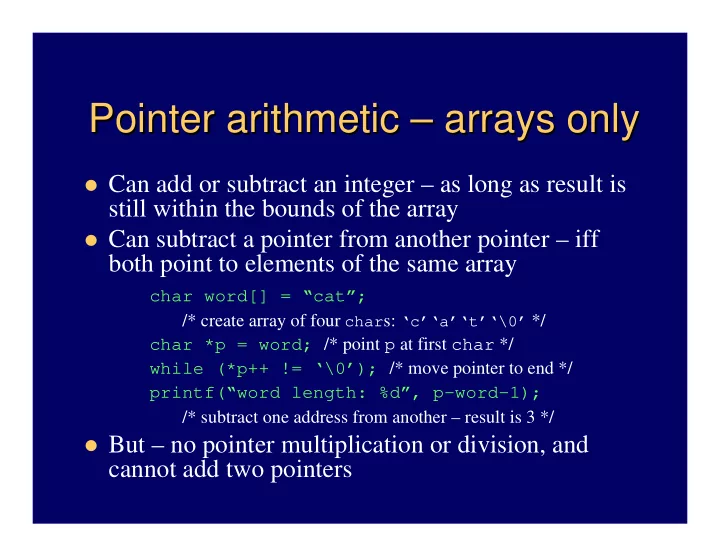

Pointer arithmetic – – arrays only arrays only Pointer arithmetic � Can add or subtract an integer – as long as result is still within the bounds of the array � Can subtract a pointer from another pointer – iff both point to elements of the same array char word[] = “cat”; /* create array of four char s: ‘c’‘a’‘t’‘\0’ */ char *p = word; /* point p at first char */ while (*p++ != ‘\0’); /* move pointer to end */ printf(“word length: %d”, p-word-1); /* subtract one address from another – result is 3 */ � But – no pointer multiplication or division, and cannot add two pointers
/* copy t to s */ /* copy t to s */ void stringcopy(char *s, char *t) � One way to implement – use subscript notation: int i = 0; while ((s[i] = t[i]) != ‘\0’) i++; � Another way – use the pointer parameters: while ((*s = *t) != ‘\0’) { s++; t++; } � Usually just increment in the while header: while ((*s++ = *t++) != ‘\0’); � And it’s possible to be even more cryptic: while (*s++ = *t++); /* Actually works! */
Multi- -dimensional and pointer dimensional and pointer Multi arrays, and pointers to arrays arrays, and pointers to arrays � Multi-dimensional arrays – arrays of arrays – int x[5][3]; /* allocates memory for 15 ints */ – Actually, 5 arrays, each able to store 3 integers � Arrays of pointers – int *p[5]; /* allocates memory for 5 pointers */ � for (i=0; i<5; i++) p[i] = x[i]; /* x as above */ � Now p can be used as an alias for x � Pointers to arrays – require pointers to pointers – int **px = x; /* points to first array in x */ – px++; /* moves pointer to next array */
Command line arguments Command line arguments � Declare main with two parameters – An argument count, and an array of argument values int main(int argc, char *argv[]) {…} – argc = 1 plus the number of tokens typed by the user at the command line after the program name – argv[0] is the program name – argv[1]…[argc-1] are the other tokens � Each one points to an array of characters (i.e., a C string) � Note equivalent way to declare second parameter – char **argv – commonly used instead of above form � Can still use array notation, but also can argv++ and so on
sizeof sizeof � A unary operator – computes the size, in bytes, of any object or type – Usage: sizeof object or sizeof(type) � If x is an int , sizeof x == sizeof(int) is true � Works for arrays too – total bytes in whole array – Sometimes can use to find an array’s length: int size = sizeof x / sizeof x[i]; � Actual type of result is size _ t – An unsigned integer defined in <stddef.h> – Similarly, diff _ t is result type of pointer subtraction � Especially useful to find the sizes of structures
C structures C structures � Structures are variables with multiple data fields � e.g., define structure to hold an int and a double : struct example{ int x; double d; }; � Create a structure, and assign a pointer to it struct example e, *ep = &e; � Now can access fields by e or by ep : e.d = 2.5; /* use name and the dot ‘ . ’ operator */ ep->x = 7; /* or use pointer-to-structure-field ‘ -> ’ operator */ � Second way is short-cut version of: (*ep).x = 7; � Note: sizeof e >= sizeof(int)+sizeof(double)
typedef and macros and macros typedef � Can precede any declaration with typedef – Defines a name for the given type: typedef struct example ExampleType; ExampleType e, *ep; /* e, ep same as prior slide */ – Very handy for pointer types too: typedef ExampleType *ETPointer; ETPointer ep; /* ep same as above */ � Macros can simplify code too #define X(p) (p)->x /* preprocessor substitutes correct code */ X(ep) = 8;
Unions Unions � Can hold different data types/sizes (at different times) � e.g., define union to hold an int or a double : union myValue{ int x; double d; } u, *up; /* u is a union, up can point to one */ � Access x or d by u. or up-> just like structures � sizeof u is size of largest field in union – Equals sizeof(double) in this case � Often store inside a structure, with a key to identify type
And see: And see: ~mikec/cs12/demo01/*.c ~mikec/cs12/demo01/*.c
Recommend
More recommend